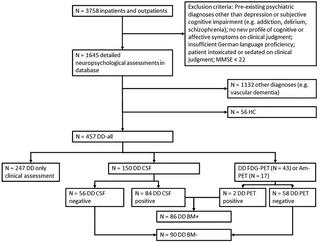PLOS ONE ( IF 3.7 ) Pub Date : 2020-04-02 , DOI: 10.1371/journal.pone.0231111 Claudia E Lanza 1 , Karolina Sejunaite 1 , Charlotte Steindel 1 , Ingo Scholz 1 , Matthias W Riepe 1

|
Objectives
Depressive symptoms and cognitive impairment often concur in older persons. Differentiating the cause of cognitive impairment in older persons with Depressive Disorder (DD) from other diseases such as Alzheimer’s Disease (AD) is challenging. The goal of this study was to characterize cognitive impairment in older persons with DD.
Design
Cross-sectional retrospective observational clinical cohort study using patient records from 2014 to 2018.
Setting
Gerontopsychiatric services of Ulm University at Bezirkskrankenhaus Günzburg serving as primary psychiatric care institution and tertiary referral center for psychiatric care for older persons.
Partcipants
DD was diagnosed according to ICD-10 criteria. When indicated by the medical history or neuropsychological assessment further diagnostic procedures were initiated. Cerebrospinal fluid (CSF) tap was routinely the first additional procedure. If patients did not consent to CSF tap or contraindications were present, 18F-fluordesoxyglucose-PET (FDG-PET) or Amyloid-PET (Am-PET) were performed.
Materials and methods
Extensive neuropsychological test battery to assess cognitive profile.
Results
457 subjects were diagnosed with DD (DD-all; age 50–94; 159 males, 298 females). Biomarkers were assessed in 176 persons; in 90 of these subjects AD-biomarkers were negative (DD-BM-; age 54–89; 40 males, 50 females), and in 86 subjects at least one biomarker was compatible with AD (DD-BM+; age 60–90; 31 males, 55 females). Cognitive performance was below healthy controls (HC; n = 56; age 50–80; 30 males, 26 females) for all groups of patients with DD. With case-control matching of HC and DD-BM- we find that executive functions are impaired in about one out of three and delayed recall in about two out of three patients with DD.
Conclusion
Cognitive impairment is frequent in older persons with DD. Cognitive profile in older patients with DD without and with biomarkers of AD is not distinguishable. Therefore, cognitive impairment due to DD should be diagnosed after exclusion of comorbid AD.
中文翻译:

关于老年患者抑郁症引起的认知障碍的难题。
目标
老年人经常出现抑郁症状和认知障碍。区分患有抑郁症(DD)的老年人与其他疾病(例如阿尔茨海默氏病(AD))的认知障碍的原因具有挑战性。这项研究的目的是表征DD老年人的认知障碍。
设计
使用2014年至2018年的患者记录进行横断面回顾性观察临床队列研究。
设置
乌尔姆大学(BezirkskrankenhausGünzburg)的老年精神病服务机构是初级精神病治疗机构和老年人精神病治疗的三级转诊中心。
参加者
DD是根据ICD-10标准诊断的。当病史或神经心理学评估表明存在进一步的诊断程序时。脑脊液(CSF)抽水常规上是第一个附加程序。如果患者不同意脑脊液抽头或禁忌症,则进行18 F-氟脱氧葡萄糖-PET(FDG-PET)或淀粉样PET(Am-PET)。
材料和方法
广泛的神经心理测验,以评估认知状况。
结果
457名被诊断患有DD的受试者(全部DD;年龄50-94;男性159,女性298)。对176名生物标志物进行了评估;在这些受试者中,有90名AD生物标志物为阴性(DD-BM-; 54-89岁;男性40名,有50名女性);在86名受试者中,至少有一种生物标志物与AD相容(DD-BM +; 60-90岁; 10-90岁)。男性31位,女性55位)。所有DD患者组的认知能力均低于健康对照组(HC; n = 56; 50-80岁;男30,女26)。通过HC和DD-BM的病例对照匹配,我们发现三分之二的DD患者执行功能受损,三分之二的患者延迟召回。
结论
DD老年人的认知障碍很常见。没有或没有AD生物标志物的DD老年患者的认知特征无法区分。因此,应在排除合并性AD后诊断为DD引起的认知障碍。



























 京公网安备 11010802027423号
京公网安备 11010802027423号